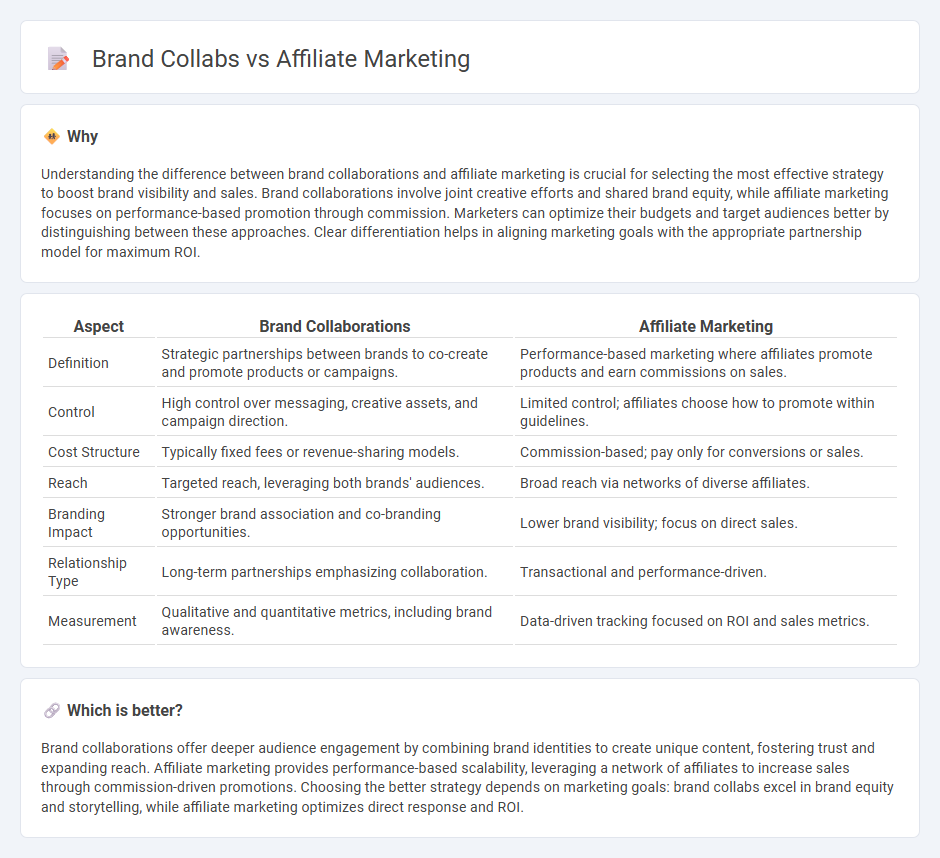
Brand collaborations create strategic partnerships where companies jointly promote products, leveraging each other's audience and brand equity to boost market presence. Affiliate marketing relies on individuals or entities promoting products through unique tracking links, earning commissions based on performance and sales. Explore the key differences and benefits of each approach to optimize your marketing strategy effectively.
Why it is important
Understanding the difference between brand collaborations and affiliate marketing is crucial for selecting the most effective strategy to boost brand visibility and sales. Brand collaborations involve joint creative efforts and shared brand equity, while affiliate marketing focuses on performance-based promotion through commission. Marketers can optimize their budgets and target audiences better by distinguishing between these approaches. Clear differentiation helps in aligning marketing goals with the appropriate partnership model for maximum ROI.
Comparison Table
| Aspect | Brand Collaborations | Affiliate Marketing |
|---|---|---|
| Definition | Strategic partnerships between brands to co-create and promote products or campaigns. | Performance-based marketing where affiliates promote products and earn commissions on sales. |
| Control | High control over messaging, creative assets, and campaign direction. | Limited control; affiliates choose how to promote within guidelines. |
| Cost Structure | Typically fixed fees or revenue-sharing models. | Commission-based; pay only for conversions or sales. |
| Reach | Targeted reach, leveraging both brands' audiences. | Broad reach via networks of diverse affiliates. |
| Branding Impact | Stronger brand association and co-branding opportunities. | Lower brand visibility; focus on direct sales. |
| Relationship Type | Long-term partnerships emphasizing collaboration. | Transactional and performance-driven. |
| Measurement | Qualitative and quantitative metrics, including brand awareness. | Data-driven tracking focused on ROI and sales metrics. |
Which is better?
Brand collaborations offer deeper audience engagement by combining brand identities to create unique content, fostering trust and expanding reach. Affiliate marketing provides performance-based scalability, leveraging a network of affiliates to increase sales through commission-driven promotions. Choosing the better strategy depends on marketing goals: brand collabs excel in brand equity and storytelling, while affiliate marketing optimizes direct response and ROI.
Connection
Brand collaborations and affiliate marketing are interconnected through their mutual goal of expanding reach and driving sales by leveraging partnerships. Brands join forces with influencers or other companies in affiliate programs to promote products authentically, resulting in shared revenue and increased brand visibility. This synergy enhances consumer trust and boosts conversion rates by combining collaborative content with performance-based incentives.
Key Terms
Commission
Affiliate marketing primarily revolves around earning commissions based on sales or leads generated through tracked links, making it performance-driven and measurable. Brand collaborations often involve fixed fees or revenue sharing without direct dependency on sales commissions, focusing more on long-term brand alignment and audience engagement. Explore deeper insights into how commission structures impact marketing outcomes and revenue models.
Partnership
Affiliate marketing relies on performance-based partnerships where affiliates promote products in exchange for commissions, emphasizing trackable sales and conversions. Brand collaborations involve deeper team integration and mutual brand enhancement through co-created content or campaigns that build long-term relationships beyond immediate sales. Explore how strategic partnerships differ in structure and benefits to maximize your marketing impact.
Brand Alignment
Brand alignment in affiliate marketing involves partnering with affiliates whose audience and values closely match the brand's identity, ensuring authentic promotion and higher conversion rates. In brand collaborations, alignment is deeper, with joint campaigns reflecting shared values and co-created content enhancing brand equity and customer trust. Explore how aligning brand values can maximize marketing impact and elevate partnerships.
Source and External Links
What Is Affiliate Marketing and How to Get Started - Coursera - Affiliate marketing is a model in which third-party publishers promote a merchant's products or services and earn a commission on sales or traffic they generate, benefiting both merchants and affiliates through revenue sharing and audience engagement strategies.
Affiliate Marketing 101: What it is and How to Get Started - BigCommerce - Affiliate marketing involves three parties: the seller who has the product, the affiliate who promotes it, and the consumer who buys, with the affiliate earning a commission as a reward for marketing the seller's product effectively to a targeted audience.
Affiliate Marketing Guide: All You Need To Know (2025) - Shopify - Affiliate marketing is a performance-based strategy where affiliates earn commissions for driving sales or other actions via unique tracking links, making it accessible for beginners to start by choosing a niche, building content, and using affiliate programs to monetize their platforms.
 dowidth.com
dowidth.com